|
Overview of Railroad Structures used by
Central Alberta Railways
Photo descriptions
and credits at bottom of page.
 Structures
have always made the railway tick. Some structures for several
decades served customers
such as stations, freight houses, stockyards and gardens
while others were necessary for the functioning of the railway
(especially during the time of steam) such as roundhouses, water towers and coal chutes.
Many structures continue to be necessary, such as yards, sidings
and bridges. Many larger communities tended to have
industrial spurs but in recent years, those industrial spurs
tended to more rural. Most
structures were/are owned by the railway but others were not, such as grain
elevators and hotels (usually in close proximity to the
station). But all were necessary for the efficient
and profitable operation of the railway. Structures
have always made the railway tick. Some structures for several
decades served customers
such as stations, freight houses, stockyards and gardens
while others were necessary for the functioning of the railway
(especially during the time of steam) such as roundhouses, water towers and coal chutes.
Many structures continue to be necessary, such as yards, sidings
and bridges. Many larger communities tended to have
industrial spurs but in recent years, those industrial spurs
tended to more rural. Most
structures were/are owned by the railway but others were not, such as grain
elevators and hotels (usually in close proximity to the
station). But all were necessary for the efficient
and profitable operation of the railway.
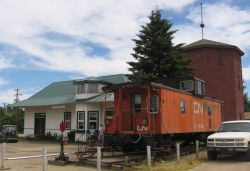
With
changes in technology, customers and other circumstances, many of
these structures were modified, replaced or eliminated. Only a
handful of structures that became obsolete have been saved and
preserved but many, that were at one time plentiful, have
disappeared forever.
Central Alberta had a
variety of all of these types of structures -- some are still
standing but most are gone. Those that survived tell a story of the
settlement and development of Western Canada. Below is a sampling
(by no means complete) of some of the structures that were in or
near Red Deer.
Stations/Depots
See:
The
railway stations of Central Alberta by railway and subdivision
Mackenzie and Mann influenced Central
Alberta's first railway stations
-
A Comprehensive Guide to the Calgary & Edmonton Railway 1891
Combination Stations
Red Deer 1910 CPR station 'jewel' still
dominates Ross Street
Red Deer once had four railway stations
Canadian Pacific Railway Stations in Central Alberta
Canadian National Railway Stations in Central Alberta
Most communities once had portable stations
for a time
Multiple Station Communities
The railway station was the hub of the communities of Western
Canada for several decades. Some communities had more than one
station if served by more than one railroad.
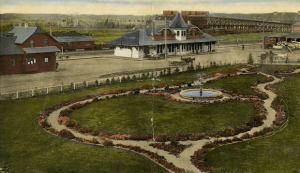
Gardens
Red Deer landmarks included a beautiful park complete with
fountain east of the station from 1910 to 1960. It was
replaced by a parking lot and later became the site of a commercial
building. The original fountain can be found at the centre of 'The
Arches' about a block south of the original park.
Bridges
See:
ACR/CPR Mintlaw Steel Trestle
Railway Bridges of Central Alberta
Alberta's 10 Largest Railway Bridges
 Water Towers Water Towers
Steam locomotives logically had an insatiable appetite for water in
order to function. They tended to be located at 30-50 km (20-30 mi.)
intervals. Most of the tanks were 40,000 gallons but those at
divisional points tended to be 60,000 gallons. Most towers in
Western Canada were enclosed to prevent freezing. Once dieselization
was complete between 1955 and 1960, most water towers were
eliminated.
CPR Red Deer -
In
1906, the railway was already preparing for major changes with an
agreement with the town to supply twice the amount of water as had
been originally negotiated. During the following year, further
improvements were made including
a new water tower.
CNR Big Valley - In 1912 Big Valley had a 60,000 gallon water tank.
A similar tank was built in Hanna in 1913.
Some of the water tanks
recorded in Central Alberta during steam era days were along the following lines:
C&E (CPR) - Strathcona, Leduc, Wetaskiwin, Ponoka,
Lacombe, Red Deer, Innisfail, Bowden,
Carstairs, Calgary
ACR (CPR) - Sylvan Lake, Crawshaw near
Eckville, Alhambra and Rocky Mountain House
CNWR (CNR) - Troon near Alix, Joffre,
Burbank, Sylvan Lake, Leslieville, Rocky Mountain House, Horburg,
Pollock and Harlesh
L&BVER/LNW (CPR) - Lacombe and halfway between Rimbey and Bluffton
Coal
Loading Facilities

Steam locomotives in Western Canada used coal to heat the water to
create the steam that powered the engines. Most large coal loading
facilities were located at divisional or terminal points. Smaller
coal loading facilities were located at junctions or intermediate
points usually no more than 75 km (50 miles) apart. In the mid to
late 1940s, most steam locomotives on the prairies converted to oil
making coal no longer necessary.
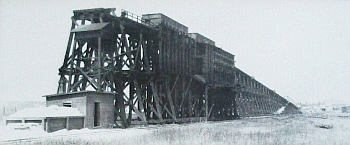 CPR Red Deer - A Red Deer landmark between 1907 and 1923 was a
280-ton elevated
gravitational trestle coal chute where box cars full of coal were
pushed to the top to load steam locomotives. It was replaced by a
more modern mechanical
coaling plant in 1923 which lasted until 1960. CPR Red Deer - A Red Deer landmark between 1907 and 1923 was a
280-ton elevated
gravitational trestle coal chute where box cars full of coal were
pushed to the top to load steam locomotives. It was replaced by a
more modern mechanical
coaling plant in 1923 which lasted until 1960.
CNR Big Valley - In
1911, the Canadian Northern Railway arrived in Big Valley. During the following year,
the town was a thriving terminal for the railway with many
improvements that included a new elevated 100-ton coal chute. It was
replaced by a 200-ton coal dock in 1915 that was used until 1948.
CNR Mirror - There was a 100-ton 2-pocket coal dock with
mechanical hoist
Other coal loading facilities
recorded in Centrral Alberta during steam era days were located along the following
lines:
C&E (CPR) - Wetaskiwin, 280-ton plant Strathcona similar
to Red Deer, Olds, Calgary
CNWR (CNR) - Nordegg
LNW/LBVER (CPR) - Lacombe
Roundhouses
and Engine Facilities
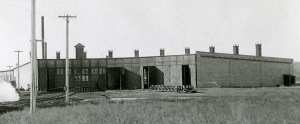
CPR Red Deer - A single stall engine house was built in the
early 1890s. It was replaced in 1907 by a 4-stall brick roundhouse
and 70 ft. turntable; 6 stalls were added in 1911. The structure was
last used in 1955 and demolished by 1963. There is no evidence left
of the structures and a commercial area is located on the site at
the southeast corner of 49 Avenue and Taylor Drive.

CNR Big Valley - In 1912
Canadian Northern at Big Valley had a five-stall roundhouse and a
70 ft. turntable. Five stalls were added to the roundhouse in 1918.
The roundhouse and other
facilities closed in 1948. An interpretive centre has been
established at the remains of the roundhouse/turntable and at one of the grain
elevators.
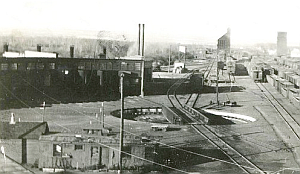
CNR Mirror - In Mirror in
late 1910 or early 1911, Grand Trunk Pacific constructed a 6-stall
roundhouse with 75' turntable, rail yards and other facilities.
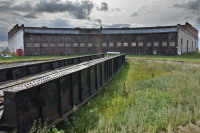
CNR Hanna - A 10-stall roundhouse and turntable was built in
1913 by Canadian Northern and five stalls were added in 1919. It was
closed in 1961 and used for a variety of purposes for several years.
It is one of a very few roundhouses still intact. There is currently
a project underway to restore it and develop an interpretive centre.
CNR Red Deer -
There is no record of an engine house at the Red Deer Canadian National
yard at the current location of the Co-op shopping centre and Park
Plaza but, being a terminal point, there was a small turntable,
likely constructed around 1923, which was removed in 1960.
Some of the other engine
facilities recorded in Central Alberta were located along the
following lines:
C&E (CPR) - 1906 12-stall roundhouse Strathcona, 18-stall roundhouse Calgary
expanded to 36 stalls; 1916 4-stall engine house at Lacombe and 4-stall roundhouse at
Wetaskiwin,
CNWR (CNR) - Engine house located at Otway near Rocky Mountain House
LNW/LBVER (CPR) - Engine houses were located at Lacombe, Bentley and Rimbey
Stockyards
Red Deer landmarks included a large CPR stock yard built in
1906. There was also a stockyard in northeast Red Deer served by
Canadian National.
There were also stockyards in Penhold, Lacombe, Ponoka, Big Valley
and several other
communities.
Yards and Sidings

CPR Red Deer -
In 1904, the Red Deer yards were expanded. In 1906, the railway was
preparing for major changes with more yard improvements as a result
of the decision to make Red Deer the divisional point between
Calgary and Edmonton. During the following year, further
improvements were made including the laying of heavier rail.

In 1948, the
rail yards were expanded due to an increase in freight traffic as a
result of the oil boom. In 1991, the downtown rail yards were torn
up as a result of the major relocation of the line to the west side
of the city.
A number of sidings between Calgary and Edmonton were lengthened
over the years to accommodate meets of longer and longer trains.
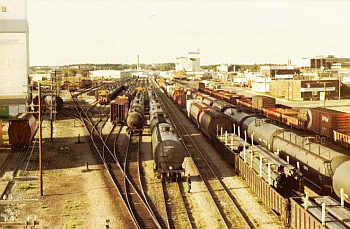 North of Red Deer and south of Blackfalds next to Highway 2A is the interchange between
Canadian National on the Brazeau subdivision and Canadian Pacific on
the Leduc subdivision, called North Junction. CN crosses over both
Hwy 2A and CP. North of Red Deer and south of Blackfalds next to Highway 2A is the interchange between
Canadian National on the Brazeau subdivision and Canadian Pacific on
the Leduc subdivision, called North Junction. CN crosses over both
Hwy 2A and CP.
One of the largest industrial rail storage yards in North America
was built at, and adjacent to, the Nova Chemicals Joffre plant
(served by CN) with 60 storage tracks having a capacity of over
1,300 cars. The Nova Chemicals plant expanded significantly its rail
yard in 2015.
A smaller but still significant yard was built at the Dow Chemical
Prentiss plant nearby in conjunction with a CP rail spur constructed
in 2000.
Grain Elevators
CPR Red Deer - New grain elevators were
constructed in 1948 north of the station and in the late 1950s, more
elevators were built on the south end of the yard. A new U.G.G.
grain elevator in 1952. Five grain elevators were
demolished (three on the east side of the yards and two on the west
side) by 1992.

CPR Innisfail - Innisfail once had the highest
concentration of grain storage between Calgary and Edmonton with
eight elevators with a total capacity of over 22,000 tonnes.
CPR Sylvan Lake -
The first grain elevator in Sylvan Lake was built in 1923 by Alberta
Pacific on the ACR line.

In 1916, the following grain elevators were recorded:
C&E (CPR) - north of Red Deer: 3 Red Deer, 2 Lacombe, Morningside, 3 Ponoka,
2
Hobbema, 5 Wetaskiwin,
2 Millet, 5 Leduc, 3 Strathcona,
C&E (CPR) -
south of Red Deer: 3 Penhold, 2
Innisfail, Bowden, 2 Olds, 4 Didsbury, 4 Carstairs,
3 Crossfield,
Airdrie, 6 Calgary

ACR (CPR) - west of Red Deer: Mintlaw, Cygnet, Sylvan Lake,
Benalto, Kootuk near Eckville and Hespero. The Mintlaw elevator was
sold and relocated to a farm northeast of Blackfalds.
CNWR (CNR) - west of Mirror: Haynes, Oberlin, Sylvan Lake, Eckville, Leslieville
LNW/LBVER (CPR) - Lacombe, northwest of Lacombe: Aspen Beach, Bentley, Rimbey, Forshee
In modern times, most of the landmark wooden grain elevators have
disappeared from the skyline. But there are a few still remaining
such as the two at Niobe north of Innisfail. There are also modern
high-throughput elevators both south and north of Olds, near Crossfield
and Bowden on the CP line and at Huxley on the CN line. At Alix, there is a
malting plant and elevator served primarily by CN but has access by
CP.
Hotels
 Red Deer Red Deer
Queen's Hotel 1891 (51 Ave. & 49 St. northeast east of
station) demolished 1899 replaced by Arlington Hotel 1899
demolished 2009,
Alberta Hotel 1892 (51 Ave. & Ross/50 St. southeast east of
station) expanded 1899 renovated and renamed Buffalo Hotel
1939 repurposed 2007,
Nelson's Hall 1899 (51 Ave. & 49 St. southwest south of
station) renamed Royal Hotel 1903 renamed Windsor
Hotel 1905 closed 1993 burned down 1994,
Alexandra Hotel 1902 (Ross St. 2 blocks east of station)
renamed the Auditorium renovated and renamed Park
Hotel 1947 repurposed 2001,
Valley Hotel 1947 (51 Ave. & 49 St. southeast east of
station) closed 2009 expanded and repurposed 2010
Industry
 CPR
Red Deer -
Industry near the CP city yards included the C.A.D.P. (Alpha
Dairies) built in 1936 and still in operation in the same location
but no longer served by rail. CPR
Red Deer -
Industry near the CP city yards included the C.A.D.P. (Alpha
Dairies) built in 1936 and still in operation in the same location
but no longer served by rail.
 Southwest of the downtown was Carling Brewery built in 1954, closed
in the early 1970s, later
occupied by a mattress factory served by CP and used today for a
variety of commercial, office and cultural businesses. Southwest of the downtown was Carling Brewery built in 1954, closed
in the early 1970s, later
occupied by a mattress factory served by CP and used today for a
variety of commercial, office and cultural businesses.
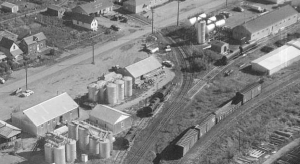 There were a number of small oil storage facilities east
of the yards in the downtown that were closed in the early 1970s.
West of the yards were American Can, the Macdonalds Consolidated
grocery warehouse and several other small warehouses and industries
that were closed in the early 1980s. There were a number of small oil storage facilities east
of the yards in the downtown that were closed in the early 1970s.
West of the yards were American Can, the Macdonalds Consolidated
grocery warehouse and several other small warehouses and industries
that were closed in the early 1980s.
Farther south, CP served Drummond Brewery (formerly Uncle Ben's
1972-79) which closed in 1995 and the Chrysler warehouse until rail
relocation occurred in 1990.
Just north of the city is the Evraz (formerly Ipsco) steel pipe plant
built in 1983,
served by CP.
CNR Red Deer -
Northeast of the city centre, Canadian National served a couple of
meat packing plants (Canada Packers opened 1970, closed in 1991) and a feedlot well into the 1980s.
A CGTX/GATX railcar repair facility built in 1969 is still one of
the major traffic generators for CN in northeast Red Deer.
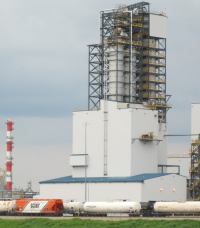
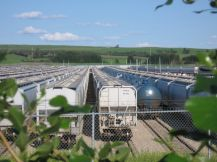 Oil,
Gas and Petrochemicals - In
more modern times, several oil and gas industry loading facilities
exist all over Central Alberta served by both CN and CP. Oil,
Gas and Petrochemicals - In
more modern times, several oil and gas industry loading facilities
exist all over Central Alberta served by both CN and CP.
The largest generators of railway
traffic are the Nova petrochemical plants at Joffre (opened in 1979
and served by CN),
the Dow petrochemical plant at Prentiss (opened in 1984 and now served by both CN and CP)
and the ethylene glycol loading facility at Blackfalds (on the CP
main line).
There was a short spur track at the landmark but relatively small
Bowden refinery (built 1962 by White Rose, taken over by Shell same
year and sold to Parkland FasGas in 1987) closed in 2001. The
refinery reopened in 2006 to produce industrial fluids. A 3-track
rail spur was constructed in 2011.
Another major generator of railway traffic is the Ram River and
Strachan gas plants west of Rocky Mountain House that produce
sulphur for export, served by Canadian National.

CPR Innisfail - In Innisfail, the Johns
Manville fibreglass insulation plant built in 1977 on the CP line also generates
some rail traffic.
Photo descriptions and credits:
Header: ACR/CPR Mintlaw bridge deck before track removal (Paul
Pettypiece 1985);
Aerial photo of Red Deer yard, station, freight house, water tower,
garden, hotels 1955
(Provincial Archives Alberta mg-30-9-1-41);
Delburne GTP station and water tower at Anthony Henday Museum (Paul
Pettypiece 2007);
Red Deer CPR station, garden, older C&ER station and coal chutes
1912 (Red Deer Archives P8737);
CNR/GTP water tower at Anthony Henday Museum in Delburne (Paul
Pettypiece 2007);
Red Deer CPR station and elevated coal chutes 1919 (Red Deer
Archives P243 - Fleming);
Elevated coal chutes at Red Deer 1916 (Canadian Pacific Archives);
Red Deer CPR roundhouse 1912 (Red Deer Archives P3907);
Big Valley CNR/CNoR roundhouse ruins historic site (Paul Pettypiece
2007);
Mirror CNR/GTP roundhouse and yard 1928 (source unknown);
Hanna CNR/CNoR roundhouse restoration & historic site 2014 (Alberta
Tourism & Culture);
Red Deer downtown CPR yard 1912 (Red Deer Archives P3771 - Willard
Trimble);
Red Deer downtown CPR yard 1947 with tank cars in winter (Provincial
Archives of Alberta A9852);
Red Deer downtown CPR yard from 45 St. overpass (Paul Pettypiece
1985);
Innisfail grain elevators and CPR Dayliner late 1960s (Canadian
Pacific Archives);
Aerial photo of Penhold CPR station and grain elevators 1948
(Stewart Ford);
Grain elevator from Mintlaw relocated to farm (Paul Pettypiece
2011);
Red Deer hotels Arlington and Alberta taken from CPR station 1909 (Glenbow
Archives PA-3689-689);
Aerial photo Alpha Dairies and grain elevator at Red Deer 1954
(Provincial Archives of Alberta
mg-309-1-30, Glenbow PA-97-29-1-30);
Former Carling brewery at Red Deer (Paul Pettypiece 1987);
Red Deer CPR yard southeast oil storage spurs and CN transfer 1955
(Red Deer Archives);
Railyard at Dow petrochemical plant at Prentiss (Paul Pettypiece
2006);
Portion of Nova Chemicals petrochemical plant complex at Joffre
(Paul Pettypiece 2014);
Johns Manville fibreglass insulation plant at Innisfail (Paul
Pettypiece 1985)
|

